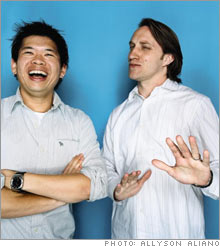|
Don't touch that dial Meet the stars of YouTube, the undisputed king of online video sharing. Can they monetize this craze?
(Fortune Magazine) -- It was a typical lunchtime at Michael's, the Manhattan restaurant and Big Media salon - a well-groomed scrum of editors, publishers, moguls, and TV stars. Onto the pitch walked the hottest new-media duo of the moment: Chad Hurley and Steve Chen, the scruffy, denim-clad founders of the online video bazaar known as YouTube.
Having launched the breakout winner in the Web video-sharing craze, the two were in town for an old-fashioned media blitz ("Charlie Rose," "Good Morning America," Fortune) and to cut some ad deals. Of course, no one in Michael's recognized them, nor did these mild-mannered entrepreneurs particularly care. But everyone in the place knew their site, and someone there may one day own it. YouTube now streams a staggering 100 million videos a day posted by its users: TV show excerpts, Michael Jordan highlights, war diaries, Nirvana concert bootlegs, you name it. Web videos are the reigning workplace time waster, a dangerous addiction. By one count, YouTube serves up 57% of all videos watched online in the U.S. So potent is YouTube's traffic that MySpace - the social-networking colossus that helped it get its start - has even tried to block it, and once-wary media companies are talking partnership. In February, NBC demanded the site take down a Saturday Night Live clip called "Lazy Sunday." By July, the network had struck a deal with the site to promote its fall lineup. "They've proven," says NBC Universal Television Group chief Jeff Zucker, "to be trustworthy partners." But YouTube isn't yet a profitable business. It produces revenues - Chen and Hurley won't say how much - from advertising. However, its hosting costs, which they also won't disclose, are huge, and the $11.5 million anted up by venture firm Sequoia Capital will only go so far. Hurley and Chen talk of "opportunities" to grow their top line, but some skeptics, notably their Web rivals, say costs and copyright issues will eventually do them in. Maybe. But YouTube's scale counts for a lot, particularly when the competition has names like Google (Charts) and Yahoo (Charts). "Your ad model means nothing if you don't have the audience," says Hurley, and his logic makes sense to knowledgeable observers. "I love YouTube," says New York VC Fred Wilson. "Say what you will about how they did it - copyrighted content, piggybacking on MySpace - they've made it to that rarefied air where the content will keep coming because they've got the eyeballs." Hurley, 29, and Chen, 27, met in Silicon Valley while working at PayPal in 1999. The idea for YouTube was spawned six years later at a PayPal alumni dinner party where the guests bemoaned the difficulty of sharing videos from their gatherings, something easily done with digital photos. The quest to solve that problem led to YouTube's February 2005 launch. The original notion was that folks would share their home videos, but early on, clips from TV shows and movies began showing up - YouTube was becoming America's collective TiVo. With copyright issues unresolved, that became both opportunity and problem. Says Hurley: "People relate us to Napster," the music-sharing service shut down by the courts. "They think this is the primary reason for our success, which is totally untrue." So, why YouTube and not its rivals? From the start YouTube was the most user-friendly and reliable site. It was the first, for example, to use Macromedia's Flash Player to streamline the viewing process. But it also understood most clearly what the people wanted, and in practice that meant a loose hand with copyrighted materials. That could come back to haunt YouTube. Yet Big Media isn't exactly complaining. "We're seeing situations where we have the marketing side of the company posting clips to our site," says Hurley, "and then we're getting notifications from the legal side asking us to take it down." With Google, MySpace, and Yahoo joining the video game, the competition is heating up. Maybe Hurley and Chen will sell. (They roll their eyes at all the gossip, including speculation that the company is worth a billion.) For now they're in no rush and feel they can fend off the heavyweights, whom they see as conventional, stuck to the notion of embedding ads in videos. On YouTube, commercials are just more content, and Madison Avenue is poised to pay for placement. "We're coming at it from a different angle," says Hurley, adding, hopefully, "They won't see us coming." From the September 4, 2006 issue
|
|

